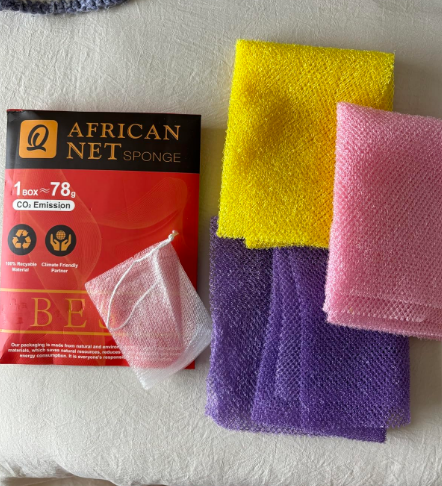Huge discounts on selected items now!
The Ultimate Guide to African Net Sponges: Benefits, Uses, and Comparisons
9/4/20247 min read


Introduction to African Bath Sponge
The African bath sponge, commonly referred to as the African net sponge, has gained substantial recognition in contemporary skincare routines. Originating from various regions across Africa, these sponges have been utilized for centuries, deeply rooted in traditional bathing practices. They are crafted from durable, natural fibers, typically derived from the Sisal plant or similar organic materials. This distinctive composition not only contributes to their longevity but also enhances their effectiveness as exfoliating tools.
Unlike conventional bath sponges which might wear out quickly and harbor bacteria, the African net sponge is highly resilient and naturally resistant to microbial growth. This makes it an ideal choice for individuals seeking a hygienic and sustainable bathing accessory. The unique structure of the African bath sponge, characterized by a net-like weave, allows for superior exfoliation. The open weave design facilitates efficient removal of dead skin cells without being overly abrasive, promoting smooth and rejuvenated skin.
The rise in popularity of holistic and natural skincare solutions has propelled the African net sponge into the spotlight. In modern skincare regimens, these sponges are celebrated for their multi-functional benefits. They are not only excellent for exfoliating but also enhance the lathering of soap, making each bath or shower a luxurious experience. Moreover, their elasticity and compact nature make them convenient for travel, thus appealing to the needs of the modern, on-the-go individual.
In contemporary usage, the African bath sponge stands out from other exfoliating tools for its ability to deliver a thorough cleanse while remaining gentle on the skin. It serves as a testament to the power of traditional wisdom harmoniously integrated with modern skincare practices. Through its unique properties and enduring effectiveness, the African net sponge continues to garner global appreciation, establishing itself as an indispensable component of daily hygiene routines.
Benefits of Using an African Net Sponge
African net sponges, known for their intricate design and durability, offer numerous advantages when incorporated into daily skincare routines. One of the prime benefits is their exceptional effectiveness in exfoliating the skin. Their unique texture ensures a thorough removal of dead skin cells, promoting smoother and revitalized skin. Routine exfoliation with an African net sponge aids in unclogging pores, which is pivotal in preventing common skin issues like acne and ingrown hairs.
Furthermore, using an African net sponge can significantly improve blood circulation. When utilized during showers or baths, the gentle scrubbing motion stimulates the skin, enhancing blood flow. This increased circulation not only supports skin health but also contributes to a youthful and glowing complexion.
A notable hygienic advantage of African net sponges is their quick-drying nature. Unlike traditional sponges, which often retain moisture and become breeding grounds for bacteria, African net sponges dry rapidly after use. This quick drying feature minimizes bacterial growth, thereby reducing the risk of skin infections and maintaining a hygienic skincare tool.
Moreover, the elongated design of African net sponges allows easy access to hard-to-reach areas, ensuring comprehensive scrubbing. This versatility in cleansing enhances overall skin health and promotes an even skin tone.
In terms of environmental impact, African net sponges are highly sustainable. They are often crafted from natural materials and require minimal processing, making them an eco-friendly choice. Their durability means they last longer than standard sponges, reducing waste and contributing to environmental conservation.
In summary, the African net sponge stands out for its exfoliating prowess, contribution to improved blood circulation, and superior hygiene standards. Its quick-drying feature and comprehensive cleansing ability, coupled with eco-friendly attributes, make it an invaluable addition to any skincare regimen, ultimately fostering healthier, smoother skin.
Daily Use of African Net Sponge: Is It Recommended?
The African net sponge, known for its unique texture and durability, has gained popularity for its exfoliating properties. While it offers numerous benefits, it is crucial to understand whether daily use is advisable. When considering daily use, one must factor in individual skin type, sensitivity, and overall dermatological health.
For individuals with normal to oily skin, the African net sponge can be an effective tool for maintaining clear, smooth skin. Its ability to exfoliate dead skin cells and stimulate blood circulation can promote a healthier complexion. However, even those with more resilient skin should use the sponge gently and monitor their skin’s reaction to avoid irritation or microtears, which could potentially lead to inflammation or infection.
Individuals with dry or sensitive skin need to exercise more caution. Over-exfoliation can strip the skin of its natural oils, leading to dryness, flakiness, and irritation. Dermatologists often recommend using the African net sponge no more than three times a week for those with sensitive skin. Incorporating a gentle cleanser and following up with a hydrating moisturizer can help maintain the skin’s natural barrier.
The adaptability of the African net sponge is notable, making it suitable for various skin types when used correctly. Dermatological advice accentuates the importance of a balanced routine. Dr. Emily Harper, a board-certified dermatologist, suggests, “Monitor your skin’s response closely. If you notice any signs of irritation or excessive dryness, reduce the frequency of use immediately.”
In conclusion, while the African net sponge can be a valuable addition to one’s skincare regimen, its daily use is not universally recommended. Tailoring use based on individual skin needs and adhering to professional advice can prevent potential adverse effects, ensuring a beneficial and balanced skincare routine.
Effectiveness of the African Net Sponge
The African net sponge is renowned for its extraordinary effectiveness in skincare routines. Its unique design, characterized by its long, net-like structure, allows it not only to cleanse the skin thoroughly but also to provide a superior exfoliation experience. Several testimonials highlight its unparalleled ability to remove dead skin cells and reveal a softer, smoother skin surface after use.
Emilia Johnson, a skincare enthusiast, shared her positive experience, stating, "I was amazed by how effective the African net sponge was. After just a few uses, my skin felt significantly softer and more radiant." Such personal accounts align with scientific studies that emphasize the exfoliating properties of this tool. Researchers have discovered that the sponge's unique texture, which balances roughness and flexibility, can effectively improve skin texture and clarity without causing irritation or damage.
Beyond anecdotal evidence, the African net sponge has been the subject of various expert reviews. Dermatologists often recommend it due to its ability to deeply cleanse pores and enhance skin's natural renewal processes. The structure of the net sponge, unlike the denser composition of loofahs or brushes, ensures better air circulation, which helps prevent bacterial buildup—a common issue with other exfoliating tools.
When comparing the performance of the African net sponge to more conventional exfoliating tools like loofahs and brushes, distinct advantages become apparent. Unlike loofahs, which can sometimes harbor bacteria if not dried properly, the net sponge's quick-drying nature provides a more hygienic option. Additionally, brushes, though effective, often require more effort and can be too abrasive for sensitive skin types. In contrast, the African net sponge balances effective exfoliation with gentleness, making it a versatile choice suitable for all skin types.
Overall, the African net sponge stands out not only for its efficiency but also for its convenience and suitability across diverse skin care needs. Its growing popularity, backed by both user testimonials and scientific validation, underscores its significant impact on improving skin health and aesthetics.
Comparing African Net Sponge to Loofah
The African net sponge stands out as a significant contender when measured against the traditional loofah. To understand their distinctions, it is essential to examine their materials, durability, texture, and effectiveness in exfoliation. The African net sponge is typically crafted from nylon or other synthetic fibers, while the loofah originates from the fibrous skeleton of the gourd-like loofah plant. This fundamental difference has a cascading effect on their properties and usage.
In terms of durability, the African net sponge generally surpasses the loofah. Nylon and synthetic fibers are resilient and can withstand frequent use without degrading rapidly. Conversely, the loofah, being a natural fiber, tends to break down over time, especially when exposed to moisture and frequent use. This characteristic makes the African net sponge a more long-lasting option.
Texture is another differentiator. The African net sponge exhibits a firm but flexible texture, ideal for creating a rich lather and providing an invigorating scrub. The loofah, while also providing exfoliation, can be rougher and may not be suitable for individuals with sensitive skin. Its coarser texture is advantageous for those needing a deeper exfoliation but may be abrasive for some skin types.
Effectiveness in exfoliation is an area where both have unique strengths. The African net sponge excels in gentle to moderate exfoliation, promoting circulation and effective removal of dead skin cells. It is ideal for daily use and suitable for most skin types. On the other hand, the loofah offers a more intense exfoliation, beneficial for areas with tougher skin, such as the feet and elbows. However, due to its abrasive nature, it is not recommended for sensitive or delicate skin.
From an environmental perspective, the loofah is biodegradable and compostable, presenting an eco-friendly option. The African net sponge, despite its higher durability, is not biodegradable due to its synthetic composition. Therefore, users with a preference for sustainable products might lean toward the natural loofah.
In conclusion, the choice between an African net sponge and a loofah largely depends on individual preferences and specific skincare needs. Those seeking durability, a smoother texture, and versatile exfoliation may prefer the African net sponge, while those prioritizing intense exfoliation and eco-friendliness might opt for the loofah.
How to Choose and Maintain Your African Net Sponge
Selecting a high-quality African net sponge requires careful consideration of several factors to ensure you benefit from its unique properties. The material of the sponge is paramount. Authentic African net sponges are typically made from durable, specially-woven nylon that is both gentle on the skin and effective at exfoliating. Ensure that the net is not too coarse to avoid skin irritation, yet robust enough to provide a deep cleanse.
Size is another critical factor. African net sponges come in various lengths and widths to cater to different needs and preferences. A longer sponge, for instance, may be more practical for reaching your back and other hard-to-clean areas of the body, while a shorter one might be handier for facial cleansing or more targeted exfoliation.
Brand reputation also plays a significant role in the selection process. Look for brands that come highly recommended by users for their quality and durability. Reading reviews and seeking endorsements from those who have experience with African net sponges can be beneficial. Top brands often adhere to higher manufacturing standards and use superior materials.
Maintaining your African net sponge properly ensures its longevity and continues its hygienic use. Rinse the sponge thoroughly after each use to remove soap and dead skin cells. Allow it to air dry completely to prevent mildew and bacterial growth. Hanging it in a well-ventilated area is ideal.
For a more thorough cleaning, it is advisable to soak the sponge in a solution of warm water and vinegar or a mild bleach solution periodically—approximately once a week. This practice not only sanitizes but also helps maintain the integrity of the material. Despite best maintenance practices, an African net sponge should be replaced every three to six months to ensure optimal hygiene and performance.
If you want to get this African net sponge click here.
